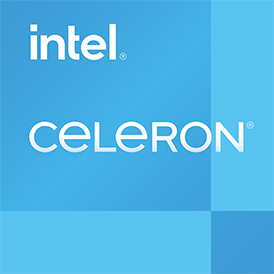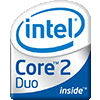
Intel Celeron 1005M Benchmark, Test and specs
Last updated:
The Intel Celeron 1005M was released in Q3/2013 and has 2 cores. The processor can process 2 threads simultaneously and uses a mainboard with the socket PGA 988. In the Geekbench 5 benchmark, the Intel Celeron 1005M achieved a result of 380 points (single-core) or 730 points (multi-core).

| Name: | Intel Celeron 1005M |
|---|---|
| Family: | Intel Celeron (165) |
| CPU group: | Intel Celeron 1000 (9) |
| Architecture: | Ivy Bridge U |
| Segment: | Mobile |
| Generation: | 3 |
| Predecessor: | -- |
| Successor: | -- |
CPU Cores and Base Frequency
The Intel Celeron 1005M has 2 cores. The clock frequency of the Intel Celeron 1005M is 1.90 GHz. An initial performance assessment can be made using the number of CPU cores.
| CPU Cores / Threads: | 2 / 2 |
|---|---|
| Core architecture: | normal |
| Cores: | 2x |
| Hyperthreading / SMT: | No |
|---|---|
| Overclocking: | No |
| Frequency: | 1.90 GHz |
| Turbo Frequency (1 Core): | -- |
| Turbo Frequency (2 Cores): | -- |
Internal Graphics
The Intel Celeron 1005M has an integrated graphics that the system can use to efficiently play back videos. The Intel Celeron 1005M has the Intel HD Graphics (Ivy Bridge GT1) installed, which has 6 streaming multiprocessors (48 shaders).
| GPU name: | Intel HD Graphics (Ivy Bridge GT1) |
|---|---|
| GPU frequency: | 0.65 GHz |
| GPU (Turbo): | 1.00 GHz |
| Compute units: | 6 |
| Shader: | 48 |
| Hardware Raytracing: | No |
| Release date: | Q4/2012 |
| Max. displays: | 3 |
|---|---|
| Generation: | 7 |
| Direct X: | 11.0 |
| Technology: | 22 nm |
| Max. GPU Memory: | 2 GB |
| Frame Generation: | No |
Hardware codec support
Processors with integrated graphics can process video codecs faster. Support for modern codecs can significantly increase system efficiency during video playback.
| h265 / HEVC (8 bit): | No |
|---|---|
| h265 / HEVC (10 bit): | No |
| h264: | Decode / Encode |
| VP8: | No |
| VP9: | No |
| AV1: | No |
|---|---|
| AVC: | Decode / Encode |
| VC-1: | Decode |
| JPEG: | Decode |
Memory & PCIeThe Intel Celeron 1005M supports a maximum of 32 GB memory. Depending on the mainboard, the processor can use a maximum of 2 (Dual Channel) memory channels. This results in a maximum bandwidth of the main memory of 25.6 GB/s. |
|
| Memory type: | Memory bandwidth: |
|---|---|
| DDR3-1600 | 25.6 GB/s |
| Max. Memory: | 32 GB |
| Memory channels: | 2 (Dual Channel) |
| ECC: | No |
| PCIe: | 2.0 x 16 |
| PCIe Bandwidth: | 8.0 GB/s |
Thermal ManagementThe Intel Celeron 1005M has a TDP of 35 W. Based on the TDP, the system manufacturer can and must adapt the cooling solution to the processor. |
|
|---|---|
| TDP (PL1 / PBP): | 35 W |
| TDP (PL2): | -- |
| TDP up: | -- |
| TDP down: | -- |
| Tjunction max.: | 105 °C |
Technical details
Modern production reduces the waste heat of a processor and increases its efficiency. The Intel Celeron 1005M is made in 22 nm and has 2.00 MB cache.
| Technology: | 22 nm |
|---|---|
| Chip design: | Monolithic |
| Socket: | PGA 988 |
| L2-Cache: | -- |
| L3-Cache: | 2.00 MB |
| AES-NI: | Yes |
| Operating systems: | Windows 10, Linux |
| Virtualization: | VT-x, VT-x EPT, VT-d |
|---|---|
| Instruction set (ISA): | x86-64 (64 bit) |
| ISA extensions: | SSE4.1, SSE4.2 |
| Release date: | Q3/2013 |
| Release price: | -- |
| Part Number: | -- |
| Documents: | Technical data sheet |
Rate this processor
Benchmark results

The benchmark results for the Intel Celeron 1005M have been carefully checked by us. We only publish benchmark results that have been created by us or that have been submitted by a visitor and then checked by a team member. All results are based on and fullfill our benchmark guidelines.
Geekbench 5, 64bit (Single-Core)
Geekbench 5 is a cross plattform benchmark that heavily uses the systems memory. A fast memory will push the result a lot. The single-core test only uses one CPU core, the amount of cores or hyperthreading ability doesn't count.

|
AMD A8-5550M
4C 4T @ 3.10 GHz |
||
|
|
HiSilicon Kirin 960
8C 8T @ 2.40 GHz |
||

|
Intel Atom C3758R
8C 8T @ 2.40 GHz |
||
|
|
Intel Celeron 1005M
2C 2T @ 1.90 GHz |
||

|
AMD A4-4020
2C 2T @ 3.40 GHz |
||

|
AMD Phenom II X3 720
3C 3T @ 2.80 GHz |
||

|
Intel Core 2 Quad Q9400
4C 4T @ 2.66 GHz |
||
Geekbench 5, 64bit (Multi-Core)
Geekbench 5 is a cross plattform benchmark that heavily uses the systems memory. A fast memory will push the result a lot. The multi-core test involves all CPU cores and taks a big advantage of hyperthreading.

|
Intel Core2 Duo E8190
2C 2T @ 2.66 GHz |
||

|
Intel Core2 Duo E8200
2C 2T @ 2.66 GHz |
||

|
AMD Athlon II X2 245
2C 2T @ 2.90 GHz |
||
|
|
Intel Celeron 1005M
2C 2T @ 1.90 GHz |
||

|
Intel Celeron N2940
4C 4T @ 2.25 GHz |
||

|
Intel Pentium E6300
2C 2T @ 2.80 GHz |
||

|
AMD A6-3400M
4C 4T @ 2.30 GHz |
||
Geekbench 6 (Single-Core)
Geekbench 6 is a benchmark for modern computers, notebooks and smartphones. What is new is an optimized utilization of newer CPU architectures, e.g. based on the big.LITTLE concept and combining CPU cores of different sizes. The single-core benchmark only evaluates the performance of the fastest CPU core, the number of CPU cores in a processor is irrelevant here.
|
|
HiSilicon Kirin 710
8C 8T @ 2.20 GHz |
||

|
MediaTek MT8173
4C 4T @ 1.80 GHz |
||

|
Intel Pentium B940
2C 2T @ 2.00 GHz |
||
|
|
Intel Celeron 1005M
2C 2T @ 1.90 GHz |
||

|
Intel Celeron J4115
4C 4T @ 2.50 GHz |
||

|
MediaTek MT8176
6C 6T @ 2.00 GHz |
||

|
Intel Pentium J4205
4C 4T @ 2.60 GHz |
||
Geekbench 6 (Multi-Core)
Geekbench 6 is a benchmark for modern computers, notebooks and smartphones. What is new is an optimized utilization of newer CPU architectures, e.g. based on the big.LITTLE concept and combining CPU cores of different sizes. The multi-core benchmark evaluates the performance of all of the processor's CPU cores. Virtual thread improvements such as AMD SMT or Intel's Hyper-Threading have a positive impact on the benchmark result.

|
Intel Pentium E6600
2C 2T @ 3.06 GHz |
||

|
MediaTek MT8173
4C 4T @ 1.80 GHz |
||

|
Intel Pentium N3530
4C 4T @ 2.58 GHz |
||
|
|
Intel Celeron 1005M
2C 2T @ 1.90 GHz |
||

|
Intel Atom x7-Z8750
4C 4T @ 2.56 GHz |
||

|
Intel Core i3-3217UE
2C 4T @ 1.60 GHz |
||

|
Intel Celeron 3215U
2C 2T @ 1.70 GHz |
||
iGPU - FP32 Performance (Single-precision GFLOPS)
The theoretical computing performance of the internal graphics unit of the processor with simple accuracy (32 bit) in GFLOPS. GFLOPS indicates how many billion floating point operations the iGPU can perform per second.

|
Intel Celeron G1610
Intel HD Graphics (Ivy Bridge GT1) @ 1.05 GHz |
||

|
Intel Pentium G2020
Intel HD Graphics (Ivy Bridge GT1) @ 1.05 GHz |
||

|
MediaTek Helio P70
ARM Mali-G72 MP3 @ 0.90 GHz |
||
|
|
Intel Celeron 1005M
Intel HD Graphics (Ivy Bridge GT1) @ 1.00 GHz |
||

|
UNISOC T616
ARM Mali-G57 MP1 @ 0.75 GHz |
||

|
Intel Pentium 2117U
Intel HD Graphics (Ivy Bridge GT1) @ 1.00 GHz |
||

|
Intel Pentium 997
Intel HD Graphics (Sandy Bridge GT1) @ 1.00 GHz |
||
Estimated results for PassMark CPU Mark
Some of the CPUs listed below have been benchmarked by CPU-monkey. However the majority of CPUs have not been tested and the results have been estimated by a CPU-monkey’s secret proprietary formula. As such they do not accurately reflect the actual Passmark CPU mark values and are not endorsed by PassMark Software Pty Ltd.

|
AMD Athlon II X2 210e
2C 2T @ 2.60 GHz |
||

|
Intel Pentium B980
2C 2T @ 2.40 GHz |
||

|
Intel Celeron G530
2C 2T @ 2.40 GHz |
||
|
|
Intel Celeron 1005M
2C 2T @ 1.90 GHz |
||

|
AMD Athlon II X2 235e
2C 2T @ 2.70 GHz |
||

|
AMD GX-412HC
4C 4T @ 1.20 GHz |
||

|
AMD A4-3400
2C 2T @ 2.70 GHz |
||
CPU-Z Benchmark 17 (Multi-Core)
The CPU-Z benchmark measures a processor's performance by measuring the time it takes the system to complete all benchmark calculations. The faster the benchmark is completed, the higher the score.

|
AMD A6-6400K
2C 2T @ 3.90 GHz |
||

|
Intel Pentium B940
2C 2T @ 2.00 GHz |
||

|
Intel Pentium N3710
4C 4T @ 1.60 GHz |
||
|
|
Intel Celeron 1005M
2C 2T @ 1.90 GHz |
||

|
Intel Pentium T4500
2C 2T @ 2.30 GHz |
||

|
AMD A4-6300
2C 2T @ 3.70 GHz |
||

|
AMD A4-5000
4C 4T @ 1.50 GHz |
||
Benchmarks

Geekbench 5 (SC)
2,488 entries
2,488 entries

Geekbench 5 (MC)
2,461 entries
2,461 entries

Geekbench 6 (SC)
1,755 entries
1,755 entries

Geekbench 6 (MC)
1,703 entries
1,703 entries

FP32 SP (iGPU)
2,042 entries
2,042 entries

PassMark CPU-Mark
2,392 entries
2,392 entries

CPU-Z Benchmark 17 (MC)
733 entries
733 entries

Geekbench 3 (SC)
942 entries
942 entries

Geekbench 3 (MC)
938 entries
938 entries
Popular comparisons
back to index






